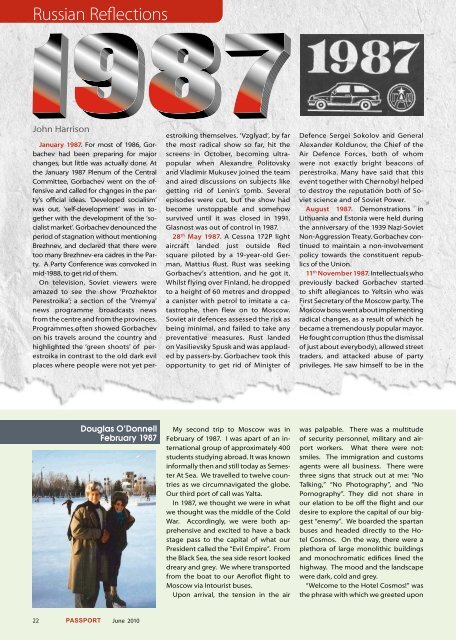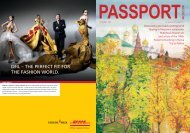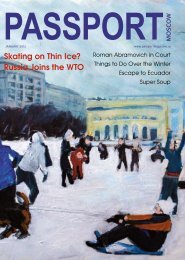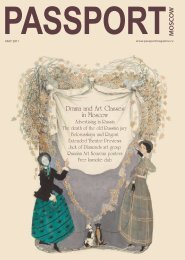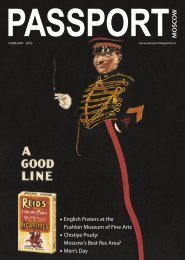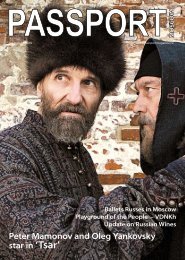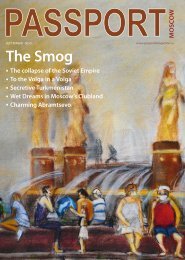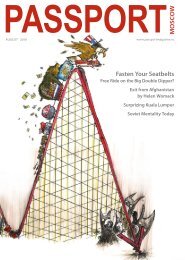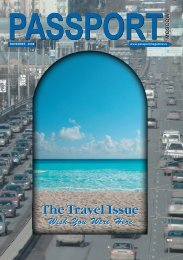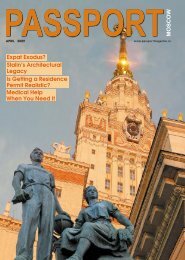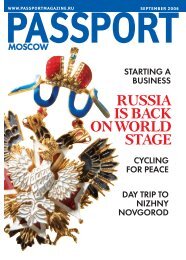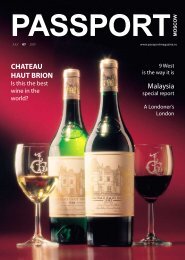M O S C O W Interview with Leonid Shishkin - Passport magazine
M O S C O W Interview with Leonid Shishkin - Passport magazine
M O S C O W Interview with Leonid Shishkin - Passport magazine
Create successful ePaper yourself
Turn your PDF publications into a flip-book with our unique Google optimized e-Paper software.
Russian Reflections<br />
John Harrison<br />
January 1987. For most of 1986, Gorbachev<br />
had been preparing for major<br />
changes, but little was actually done. At<br />
the January 1987 Plenum of the Central<br />
Committee, Gorbachev went on the offensive<br />
and called for changes in the party’s<br />
official ideas. ‘Developed socialism’<br />
was out, ‘self-development’ was in together<br />
<strong>with</strong> the development of the ‘socialist<br />
market’. Gorbachev denounced the<br />
period of stagnation <strong>with</strong>out mentioning<br />
Brezhnev, and declared that there were<br />
too many Brezhnev-era cadres in the Party.<br />
A Party Conference was convoked in<br />
mid-1988, to get rid of them.<br />
On television, Soviet viewers were<br />
amazed to see the show ‘Prozhektor<br />
Perestroika’; a section of the ‘Vremya’<br />
news programme broadcasts news<br />
from the centre and from the provinces.<br />
Programmes often showed Gorbachev<br />
on his travels around the country and<br />
highlighted the ‘green shoots’ of perestroika<br />
in contrast to the old dark evil<br />
places where people were not yet per-<br />
Douglas O’Donnell<br />
February 1987<br />
22 June 2010<br />
estroiking themselves. ‘Vzglyad’, by far<br />
the most radical show so far, hit the<br />
screens in October, becoming ultrapopular<br />
when Alexandre Politovsky<br />
and Vladimir Mukusev joined the team<br />
and aired discussions on subjects like<br />
getting rid of Lenin’s tomb. Several<br />
episodes were cut, but the show had<br />
become unstoppable and somehow<br />
survived until it was closed in 1991.<br />
Glasnost was out of control in 1987.<br />
28 th May 1987. A Cessna 172P light<br />
aircraft landed just outside Red<br />
square piloted by a 19-year-old German,<br />
Mattius Rust. Rust was seeking<br />
Gorbachev’s attention, and he got it.<br />
Whilst flying over Finland, he dropped<br />
to a height of 60 metres and dropped<br />
a canister <strong>with</strong> petrol to imitate a catastrophe,<br />
then flew on to Moscow.<br />
Soviet air defences assessed the risk as<br />
being minimal, and failed to take any<br />
preventative measures. Rust landed<br />
on Vasilievsky Spusk and was applauded<br />
by passers-by. Gorbachev took this<br />
opportunity to get rid of Minister of<br />
My second trip to Moscow was in<br />
February of 1987. I was apart of an international<br />
group of approximately 400<br />
students studying abroad. It was known<br />
informally then and still today as Semester<br />
At Sea. We travelled to twelve countries<br />
as we circumnavigated the globe.<br />
Our third port of call was Yalta.<br />
In 1987, we thought we were in what<br />
we thought was the middle of the Cold<br />
War. Accordingly, we were both apprehensive<br />
and excited to have a back<br />
stage pass to the capital of what our<br />
President called the “Evil Empire”. From<br />
the Black Sea, the sea side resort looked<br />
dreary and grey. We where transported<br />
from the boat to our Aeroflot flight to<br />
Moscow via Intourist buses.<br />
Upon arrival, the tension in the air<br />
Defence Sergei Sokolov and General<br />
Alexander Koldunov, the Chief of the<br />
Air Defence Forces, both of whom<br />
were not exactly bright beacons of<br />
perestroika. Many have said that this<br />
event together <strong>with</strong> Chernobyl helped<br />
to destroy the reputation both of Soviet<br />
science and of Soviet Power.<br />
August 1987. Demonstrations in<br />
Lithuania and Estonia were held during<br />
the anniversary of the 1939 Nazi-Soviet<br />
Non-Aggression Treaty. Gorbachev continued<br />
to maintain a non-involvement<br />
policy towards the constituent republics<br />
of the Union.<br />
11 th November 1987. Intellectuals who<br />
previously backed Gorbachev started<br />
to shift allegiances to Yeltsin who was<br />
First Secretary of the Moscow party. The<br />
Moscow boss went about implementing<br />
radical changes, as a result of which he<br />
became a tremendously popular mayor.<br />
He fought corruption (thus the dismissal<br />
of just about everybody), allowed street<br />
traders, and attacked abuse of party<br />
privileges. He saw himself to be in the<br />
was palpable. There was a multitude<br />
of security personnel, military and airport<br />
workers. What there were not:<br />
smiles. The immigration and customs<br />
agents were all business. There were<br />
three signs that struck out at me: “No<br />
Talking,” “No Photography”, and “No<br />
Pornography”. They did not share in<br />
our elation to be off the flight and our<br />
desire to explore the capital of our biggest<br />
“enemy”. We boarded the spartan<br />
buses and headed directly to the Hotel<br />
Cosmos. On the way, there were a<br />
plethora of large monolithic buildings<br />
and monochromatic edifices lined the<br />
highway. The mood and the landscape<br />
were dark, cold and grey.<br />
“Welcome to the Hotel Cosmos!” was<br />
the phrase <strong>with</strong> which we greeted upon


